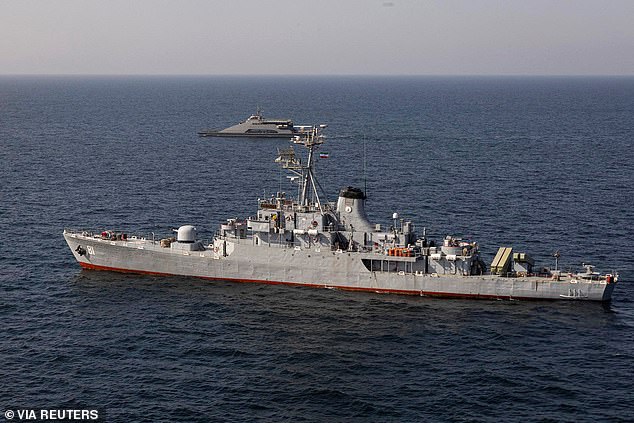MARK ALMOND: Make no mistake, this escalating crisis in the Red Sea could prove to be America’s Suez
The world's attention is focused on the bloody tragedy unfolding in the Gaza Strip, as well as the nearly two-year disaster in Ukraine.
But a dangerous new blockage has emerged in the jugular vein of global trade: the Red Sea.
Unless the blockade is lifted, the consequences could spell disaster for the international economy – and for world peace.
Yesterday, Defense Secretary Grant Shapps warned that Britain is considering launching air strikes against Houthi rebels who are disrupting shipping at the southern end of the Red Sea and causing chaos on global trade routes.
Such a move, in coordination with the US, would mark a dramatic escalation of this worsening crisis.
Boats sail past the cargo ship Galaxy Leader seized by the Houthis off the coast of Al-Salif port on the Red Sea in Hodeidah province, Yemen

Defense Secretary Grant Shapps (pictured) warned that Britain is considering launching air strikes against Houthi rebels who are disrupting shipping at the southern end of the Red Sea and causing chaos on global trade routes
Because these events are not a side issue of the conflicts in the Middle East and the Eurasian steppe. They could prove the decisive battle of 2024.
The problem exploded several weeks ago when the Houthis, a bloodthirsty Yemeni militia armed by Iran's mullahs, began carrying out missile and drone attacks on cargo ships in the Red Sea.
About 40 percent of Europe's trade with Asia, and 12 percent of all world shipping, passes through this crucial route to the Suez Canal, meaning any disruption will have a disproportionate impact on the global economy.
(In 2021, when container ship Ever Give ran aground and blocked the canal for six days, the cost to international trade was £700 million per day.)
The Houthis, who overthrew Yemen's UN-recognized government in 2014, launched their latest attacks after Hamas's Oct. 7 atrocities and Israel's heavy-handed response. The radical Shia Houthis see Israel as their “ideal enemy,” embodying everything they hate.
Houthi leaders warned that all ships linked to Israel were “a legitimate target” – and made good on the threat in November when their terrorists hijacked a British-owned Israeli-linked ship, the Galaxy Leader, traveling from Turkey to India .

An Iranian warship takes part in a joint military naval exercise between Iran, Russia and China in the Gulf of Oman last March, Iran, Russia and China in the Gulf of Oman
Slick footage posted online shows several masked Houthi fighters landing by helicopter on the ship's deck, brandishing automatic weapons and holding the crew – none of whom are believed to be Israeli – at gunpoint.
As Mr Shapps noted yesterday, similar attacks increased by 500 per cent in November and December.
On December 16, HMS Diamond fired a Sea Viper missile to destroy a Houthi attack drone: the first time in more than 30 years that our Navy had shot down an air target.
The Houthis, meanwhile, have repeatedly fired on Western ships, damaging a Norwegian tanker and also attacking French warships. Last month, the USS Carney shot down four drones launched by the Islamists at commercial ships, and just two days ago the US Navy sank three Houthi boats attempting to intercept a container ship, killing 10 militants.
Iran has since sent its own warship to the Red Sea, threatening an alarming clash with the US or our Royal Navy.
Collectively, these skirmishes had a rapid effect.
About a dozen international shipping companies, including Maersk, MSC and France's CMA CGM, have halted operations in the region and instead sent their ships on an 8,000-kilometer longer voyage around the Cape of Good Hope.
The resulting disruption is likely to lead to sharp increases in oil prices and other consumer goods, threatening a new wave of inflation in what is an election year in both Britain and the US.
That is why Western governments feel they must suppress Houthi piracy by any means necessary.
Britain and the US are said to be about to issue a 'final verbal warning' to the Houthis, ordering them to cease their attacks or take direct military action. US Secretary of Defense Lloyd Austin has already announced a naval coalition – dubbed 'Operation Prosperity Guardian' – to defend shipping in the Red Sea.
But if the Americans think they can easily destroy the Houthis, they are being misled. The truth is that this conflict has sinister echoes of the humiliating Suez Crisis of 1956.
To summarize, at the time, Egyptian President Nasser suddenly nationalized the Suez Canal, threatening to choke off Europe's access to Middle Eastern oil. Britain and France – secretly aided by Israel – invaded Egypt.
That show of force was intended as a demonstration of technological superiority against an upstart. But Suez turned out to be a fiasco, triggering a political crisis at Westminster, alienating our allies and ending our status as a first-tier power.
There are reasons to be more pessimistic about the West's contemporary prospects.
First of all, the Houthis are not fraudsters. Battle-hardened, they have been waging war against the Western and Saudi-backed government of Yemen for more than a decade. More than 100,000 fighters are expanding their ranks, and they have ballistic missiles and cheap but effective drones with which to wreak havoc.
Secondly, there are the costs. The Houthis' “suicide drones” sell for as little as $2,000 each, and supplies are virtually unlimited. The missiles we use to destroy them cost about $2 million each.
The US is now waging proxy wars on two fronts: the Gaza Strip and Ukraine. Even the Pentagon's enormous budget of some $824 billion cannot arm Kiev and Israel, let alone wage a new war in the Middle East, as well as keep an eye on China.
Third, with the military quagmires of Afghanistan, Iraq and Somalia still fresh in our minds, there is no chance that the US will take action, which dramatically reduces the options.
Finally, a fleet of 19 ships is unlikely to achieve much success in the region even if the Yemeni mainland is destroyed. The Saudis, armed and advised by the West, tried something similar, and the Houthis fought them into a ceasefire.
So the Allied Red Sea Fleet and the threat of air strikes are not a quick solution. Instead, the need to use them, like Britain's ignominious attempts to seize Suez in 1956, is a striking illustration of the West's overall weakness.
America cannot run away from the crisis either. History shows that when a stabilizing power like Britain, France – or even the Roman Empire – withdraws from a theater, the result is always more conflict and bloodshed.
Look at the Taliban's return to Afghanistan after the West's withdrawal in 2021, and Iran's descent into an impoverished basket case, run and ruined by the murderous ayatollahs, since the fall of the pro-Western Shah in 1979.
If the US, with all its might and might, is deemed unable to overwhelm a weak militia like the Houthis, then another hostile power – such as China, which has a base in nearby Djibouti – could seize the moment to to take place. the world's preeminent superpower. And that should concern all of us.
After 1956, Prime Minister Sir Anthony Eden's wife Clarissa said it felt like the Suez Canal was flowing through her drawing room. Britain's role in international affairs had disappeared, and with it her husband's premiership.
A similar fate may await the aging President Biden. He must act decisively – but can he succeed, or even weather a prolonged crisis?
As the new year dawns, I fear that we will witness – in real time – the collapse of the American power that has protected us all our lives.
- Mark Almond is director of the Crisis Research Institute, Oxford.
